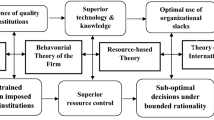Abstract
This chapter examines the operations of three international firms operating in Ghana in order to explain how their actions intersect the developmental aspirations and host-country concerns of Ghana.1 Our position is that the core values of these firms and the positions they espouse about human and social development greatly influence the way they use the human, social, financial, productive and natural capital Ghana has made available to them. Are these firms engaged in building local capacity, developing local assets, integrating themselves and generally ensuring that they add value to the Ghanaian context — and are just? For each of the three companies, this chapter will address four questions particularly sensitive in the Ghanaian context. First, are the firms conducting human resource management and skill development in such a way as to build local capacity? Second, do their governance and management structures involve local people? The use of expatriate managers creates the impression of foreign ownership, domination and concrete ceilings, which cap the progress of local managers. Third, do they integrate their supply chains within the economy of Ghana? Fourth, do they demonstrate social responsibility by providing support for the underprivileged, whether through charity or human resource investments in schools? This chapter will conclude with a number of prescriptive suggestions for international companies doing business in developing areas.
Access this chapter
Tax calculation will be finalised at checkout
Purchases are for personal use only
Preview
Unable to display preview. Download preview PDF.
Similar content being viewed by others
References
Adams, J. (1965) ‘Inequity in Social Exchange’, in L. Berkowitz (ed.), Advances in Experimental Social Psychology, vol. 2 (New York: Academic Press), pp. 267–99.
Asenso-Okyere, K. (2001) Wealth Accumulation, Utilization and Retention, Professorial Inaugural Lecture, University of Ghana (Accra: Ghana Universities Press).
Aykac, A. and Gordy, M. (1993) ‘The Emerging Corporatism: Business Executives as Social Managers’, in B. Sutton (ed.), The Legitimate Corporation (Oxford: Blackwell), pp.211–23.
BAT (2001) BAT Ghana: Annual Report (Accra and Takoradi: BAT Ghana Limited).
CSP Task Force (1980): Task Force on Corporate Social Performance Business and Society: Strategies for the 1980s (Washington: US Department of Commerce).
GSRC (2000): Ghana Securities Regulatory Commission Corporate Governance Circular # 3 (November) (Accra).
HD Report (2000): Ghana Human Development Report (Accra: UNDP/ISSER).
Heller, A. (1988) General Ethic (Oxford: Blackwell).
Hill, C. (1998) International Business. Competing in the Global Market Place (Boston: McGraw-Hill).
James, S. and Parker, R. (1990) A Dictionary of Business Quotations (London: Routledge).
Kamoche, K. (1996) ‘Strategic Human Resource Management Within a Resource Capability View of the Firm’, Journal of Management Studies, vol. 33(2), pp. 213–34.
Loughlin, C. and Barling, J. (2001) ‘Young workers’ Work Values, Attitudes and Behaviours’, Journal of Occupational and Organisational Psychology, vol. 74(4), pp. 543–58.
Nicholson, N. (1993) ‘Business Ethics — of Academic Interest to Organisational Psychology?’, The Occupational Psychologist, vol. 21, pp. 31–7.
Nicholson, N. (2000) Managing the Human Animal (London: Texere).
Porter, M. E. (1990, 1998) The Competitive Advantage of Nations (NY: Free Press).
PsyconH.R (2002) ‘Corporate Image Survey’, Unpublished Consultancy Report (Accra).
Puplampu, B. (1993) ‘Differential Perceptions of Expatriation between UK and Ghana’, PhD Thesis (London: University of East London).
Puplampu, B. (1995) Towards a General Theory of Expatriation, Working Paper Series (London: University of Westminster Press).
Puplampu, B. (2003) ‘Of Ants, Mice and Men — An Organisational Psychologist’s Views on Corporate and Institutional Leadership in Ghana’, Interfaculty Lecture, University of Ghana, Legon, March.
UN (1998): United Nations A Vision of Hope: 50th Anniversary Publication (New York: UN).
UNIL (2001) Report and Financial Statement (Accra: Unilever Ghana Limited).
Editor information
Editors and Affiliations
Copyright information
© 2004 Bill Buenar Puplampu
About this chapter
Cite this chapter
Puplampu, B.B. (2004). Capacity Building, Asset Development and Corporate Values: A Study of Three International Firms in Ghana. In: Bird, F., Herman, S.W. (eds) International Businesses and the Challenges of Poverty in the Developing World. Palgrave Macmillan, London. https://doi.org/10.1057/9780230522503_5
Download citation
DOI: https://doi.org/10.1057/9780230522503_5
Publisher Name: Palgrave Macmillan, London
Print ISBN: 978-1-349-51533-2
Online ISBN: 978-0-230-52250-3
eBook Packages: Palgrave Business & Management CollectionBusiness and Management (R0)




